When Rose from North Perth decided that she had the time and space in her life to foster an adult dog, she knew she wanted to make a difference to the life of an animal, but also to a person in a difficult situation.
“It's interesting how with particular animals come into your life,” Rose explains, “I have never sought one out.”
The RSPCA recognises the importance of offering refuge to animals from households experiencing domestic violence. When victims of domestic violence seek refuge and remove themselves from a dangerous situation, they’re often unable to take their pets with them. RSPCA shelters in each state do what they can to help provide safe passage for animals in these circumstances.
The Pets in Crisis program
RSPCA WA’s Pets in Crisis program was started to offer a temporary home for pets from households experiencing domestic violence while the pet’s owner seeks refuge of their own.
“Sasha was different. She'd been living temporarily with a friend of her family because she was pregnant, and she'd just weaned off her puppies. Unfortunately, that friend couldn't continue to look after her any longer, and the rest of the details of Sasha’s case are confidential.”
“It was a quick 24-hour turnaround. The RSPCA asked if I could come out the next day, to introduce my dog to Sasha, with a trained RSPCA officer in attendance who knows dog behaviour.” Luckily, Sasha, a Husky, and Rose’s original Staffordshire Brandi got along well. “The next day, we picked her up and she came into our house, and she's been here since!”
Rose was originally attracted to RSPCA WA’s Pets in Crisis program, which she found out about through her regular volunteering work.
“I volunteer at RSPCA every couple of months for their corporate support days. Through this, I met Inspector Nat Foster who gave a presentation about Pets in Crisis. The more I listened, the more I thought this would be exactly the type of thing I would like to do.”
As Rose already had Brandi the Staffy at home, welcoming a new member of the family came with plenty of preparation. Rose made the decision that an older, female dog would be best fit for her situation.
“Brandi was really beautiful, and good with other dogs and I thought the idea of helping an animal - but in turn, helping a person - was something that really attracted me to the program. I also loved the idea that the pet and their owner would be reunited.”
In Rose’s case, having someone at home to settle Sasha made the integration of the two adult dogs easier.
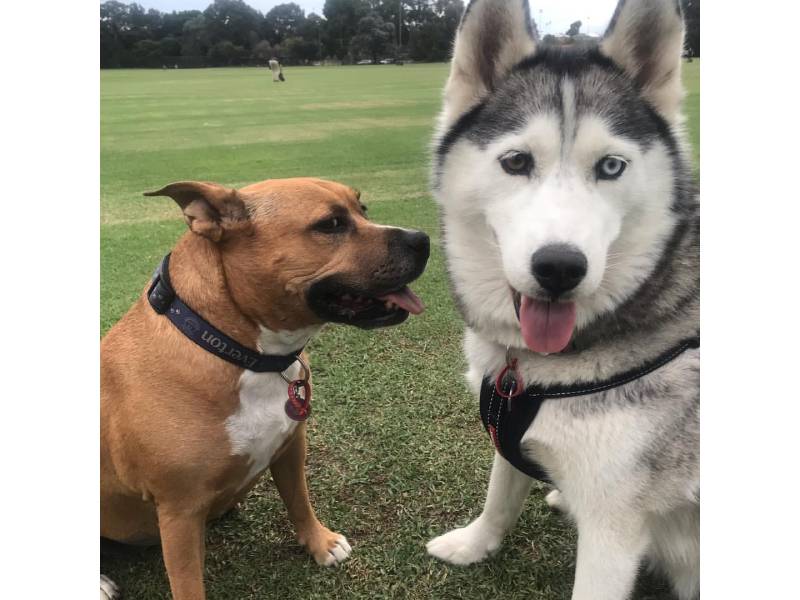
“It’s essential that potential foster owners look at whether they can be at home, or that someone else can be there. My previous partner’s job allowed us to foster because he worked shifts, while I was Monday to Friday, 9 to 5. There was more flexibility for him to be at home.”
“This is something that you really need to consider when deciding to become a foster. You really need that support.”
Every pet has their own individual needs
Every animal in the Pets in Crisis program comes with their own needs, and Sasha’s case was no different. “Sasha had just been sterilised, and I hadn't dealt with a dog that had just been desexed in a long time, and even had a minor ear infection.”
One of the benefits of fostering via RSPCA WA’s program is that vet treatment and food is provided at no cost to the fosterer. “Knowing that I had the ability to take Sasha to and from the vet when I needed to and not have to worry about cost was great, as I already had a dog that I was paying for. That helped me make the decision to foster.”
Rose explains that, when someone fills out the online form to become a foster carer through the Pets in Crisis program, an RSPCA representative will come and assess their home, and any other animals in the home, for suitability to be part of the program.
“They make it so easy, and that's what I try to promote. Yes, you have to fill out some forms, but it’s an easy process. It was a number of months before the right dog came along, where the RSPCA decided that I was the right home for the specific situation. They called me and said, ‘Look, we have a dog that has just been taken from a home and needs to be fostered now’.
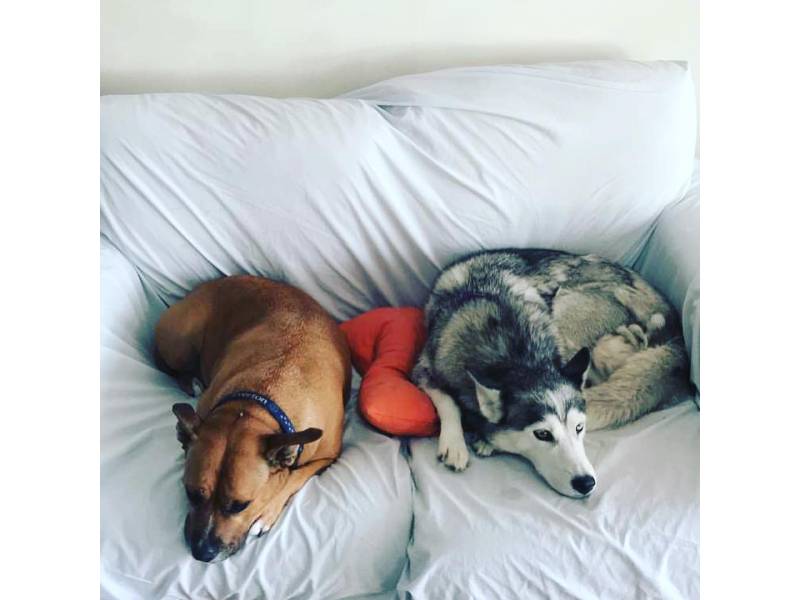
Rose took Brandi to meet Sasha at a park, under the trained eye of an RSPCA worker. “The dogs got along after taking a while to get used to each other,” Rose says. “Brandi is a Staffy, and Staffies and Huskies are two very opposite breeds but when they first met, they started becoming close.”
Sadly, Brandi, passed away in May due to an inoperable tumour. “The dogs lived together for a year. I think the most beautiful thing about them is that having Sasha in the house kept Brandi young; and kept her going as long as she possibly could.”
“I have this story from when they first moved in together: At first, Sasha was kind of like an ‘exchange sister’ - she was happy in the house, she was comfortable, but she spoke a bit of a different language. We were all still trying to get used to each other.”
“But the more they lived together, and as time went on, the two dogs became kind of like two middle aged women living together. At first, they appreciated each other's company, but they stuck to their own couches and they did their own thing. They had different interests, but when Brandi got sick, Sasha picked up on it, and they became like sisters.”
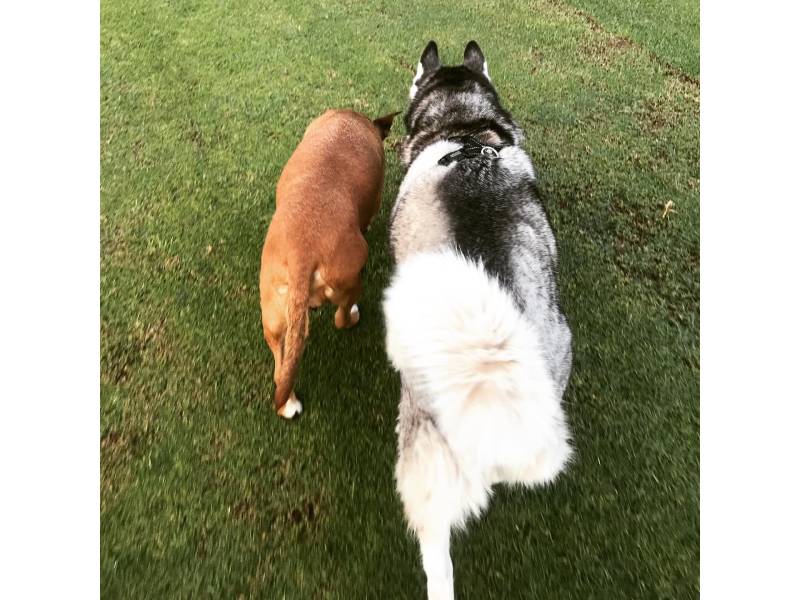
“The two dogs would enjoy just hanging out together and looking out for each other. “When they would go to the park, they would go off together, doing things. They had a relationship that changed over their time together.”
“I think that Sasha knew before Brandi passed away that that's what was happening, and it was a hard adjustment, but I think she was as concerned about me as I was about her.”
The personality of a rescue: a beautiful companion
Rose explains that Sasha’s temperament and breed, and the fact that she was a rescue, all affected her personality.
“I knew nothing about Huskies,” Rose says, “and she's pretty hilarious. Even though Sasha had a number of litters at quite a young age (which I personally don't agree with), and there were obviously a lot of things that happened in her house, she has a really beautiful nature. I knew that she must have been a great companion to her owner in times of distress, because when I have been upset, she sits next to me.”
Rose says that even though she didn’t raise Sasha from a puppy, that many of her qualities are inherent. “She really is this beautiful companion. I know that she might have had a ‘different’ life before joining my household but all her qualities, what I wanted in a companion, are natural.”
Sasha the Husky is a deep thinker too. “I have this joke that she can see spirits or things that aren't there, because we will just be walking and then she'll just stop and look around. Or, we will be at the dog park (she likes dogs, but she prefers humans) she'll just sit and watch the world, in the middle of a dog park, happily, and just watch. In all of these environments, all these chaotic things can be happening, and she'll sit down and just watch.”
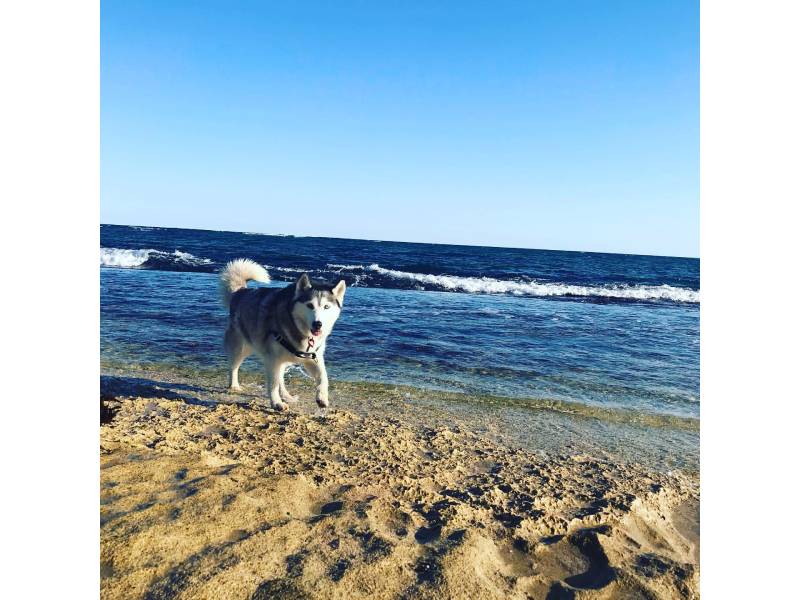
“She's obviously a very deep thinker. There's a lot to her but she is just a perfect companion. She’s got that soul to her and she's not the typical hyperactive Husky.”
The RSPCA WA’s Pets in Crisis program is originally a three month fostering, and Rose was prepared to return Sasha to her owner but over the time she spent with Rose, it became clear that her owner could no longer care for her needs.
The intention or ideal situation is to return the dogs to their original owner, this may not always be possible and so sometimes a new home is needed. In some cases, the fosterer may be able to adopt the dog or another home can be found.
“I did end up adopting her. I was always happy for her to go back to her owner because I could see how wonderful she was. Because I had very regular contact with RSPCA, they knew that I was very interested in adopting her and they wanted the animal to be somewhere that they're happy and loved.”
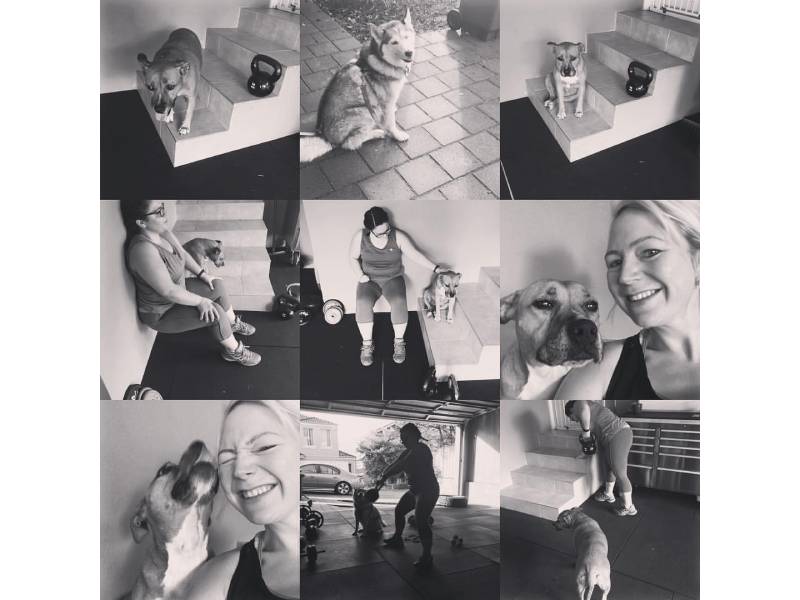
The program supports foster carers with free vet visits and food for the fostered animal, as well as advice. “I think it's important to acknowledge that you alone don't have to be fully responsible, there's a team that's responsible and if any point your situation changes, the RSPCA will help you.”
Rose talks about the emotional rewards of having a pet. “My dog is the last face I see before I go to bed and the first face I see when I wake up in the morning. Whatever happens during the day, when I see that face, it is the best thing. Even if I have a bad day, I still need to take my dog for a walk - and seeing her just happy, it's the best.”
“It's just amazing what animals, and not just dogs, do for your mental health. They are there to be your companion, and they are beautiful.”
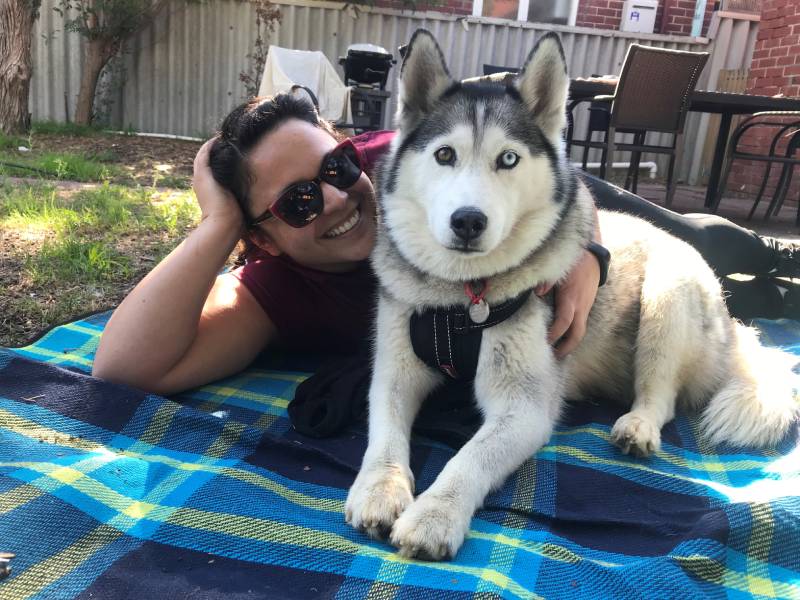
23 Jan 2020
